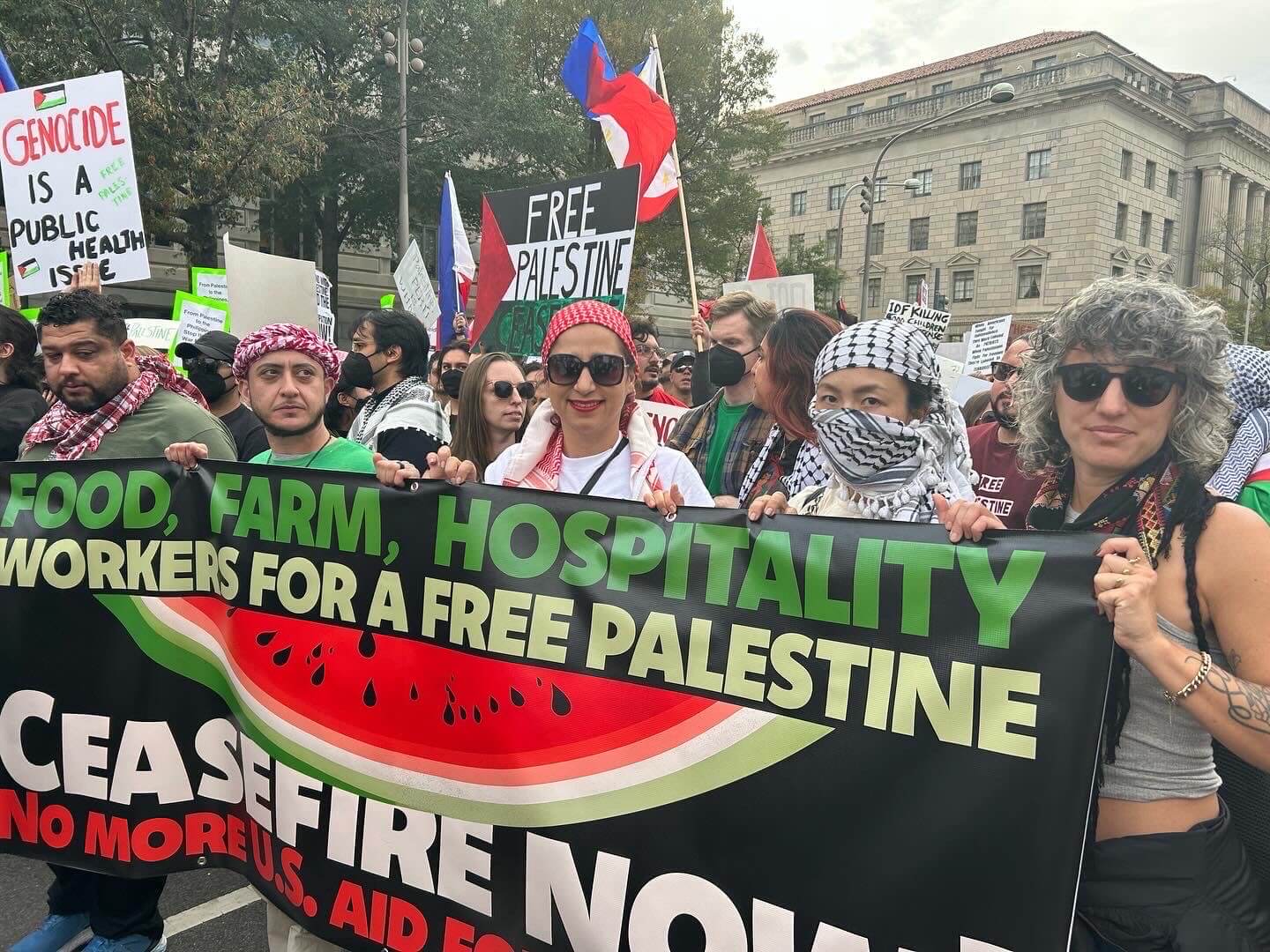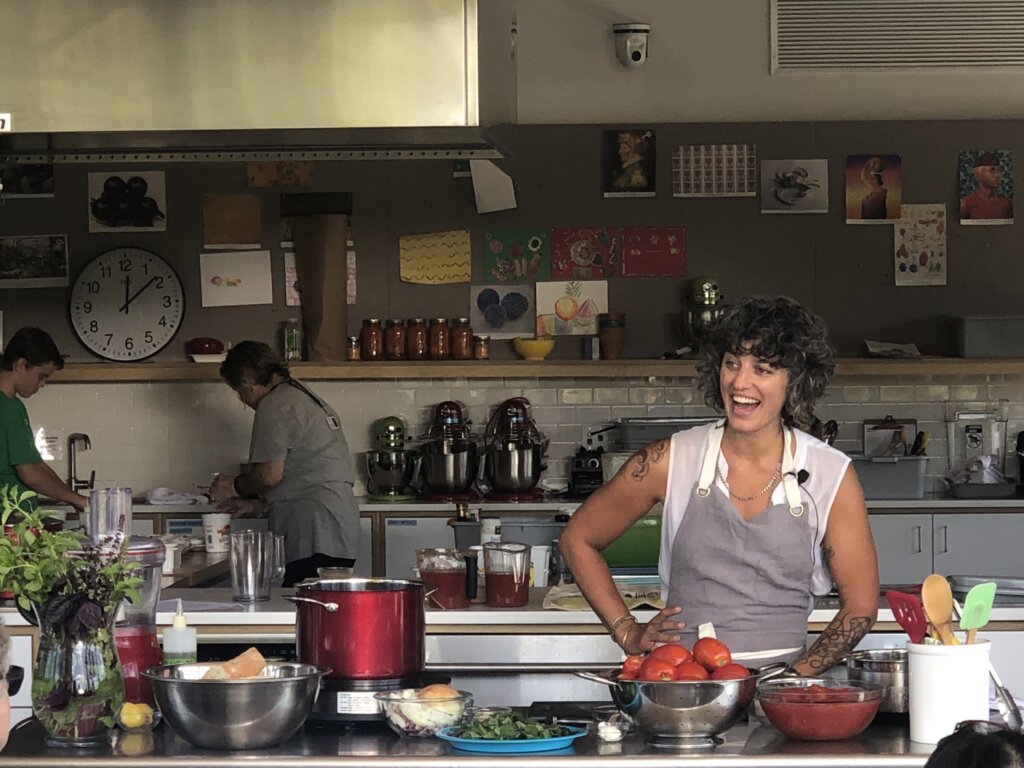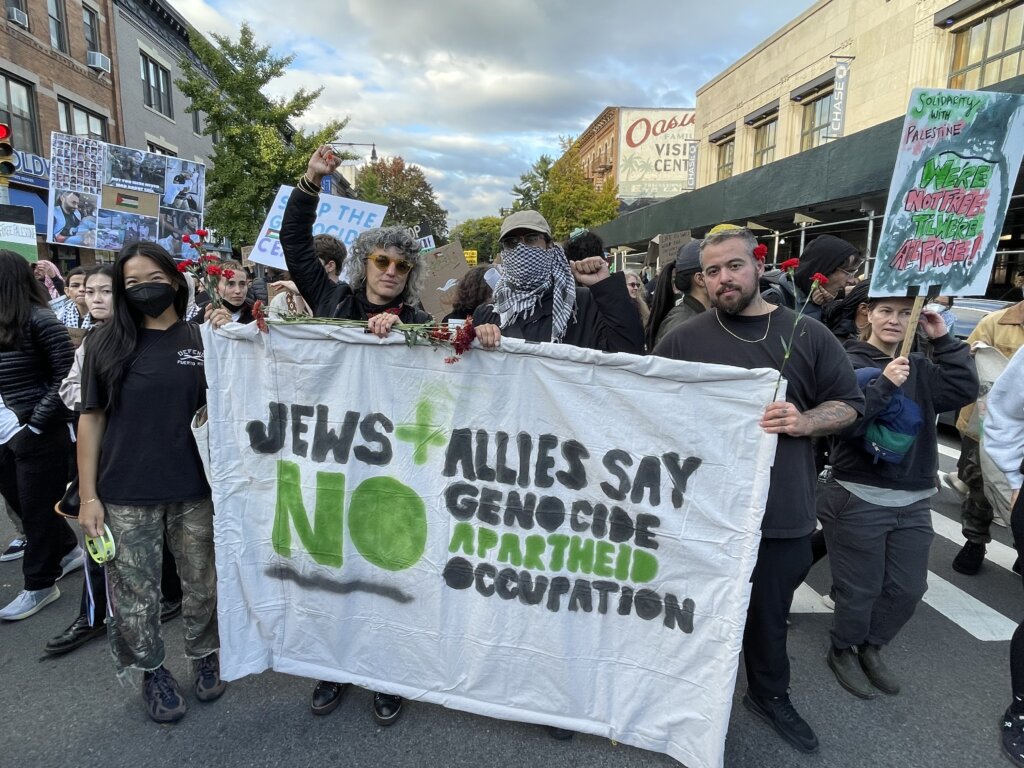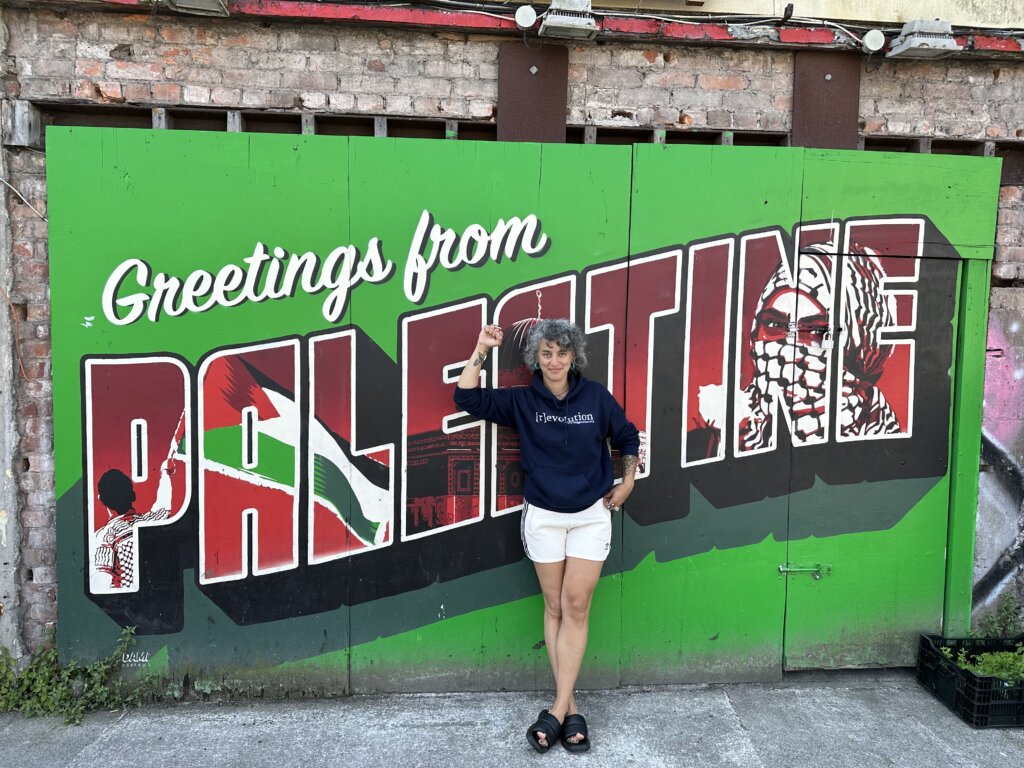This Israel-born, Jewish chef is demanding a cease-fire
Ora Wise joins a team of Palestinian chefs mobilizing the food industry in support of besieged Palestinians

Graphic by Angelie Zaslavsky
“I’m devastated and exhausted,” Ora Wise told me on a video call from her New York City apartment, her facial features flickering between fatigue and animation.
Just three days earlier, the chef and food activist marched in the nation’s capital to call for a cease-fire in Israel’s siege of Gaza. The offensive has claimed the lives of over 10,000 Palestinians, nearly half of them children, since Oct. 7, when over 1,400 Israelis were killed in Hamas’ terrorist attacks.
The day after our interview, Wise was scheduled to appear in court for charges of obstructing traffic and failure to disperse during another cease-fire demonstration the previous month.
In Washington, D.C., this past weekend, Wise marched alongside three Palestinian American chefs — Reem Assil of Reem’s California in Oakland, Omar Anani of Saffron De Twah in Detroit, and Marcelle Afram of Shababi in Washington — and Kimberly Chou Tsun An, a writer and farmer. The five of them demonstrated under the banner of Hospitality for Humanity, a coalition of food professionals organizing for a cease-fire and against U.S. funding of the Israeli military. Assil, who was a full-time labor organizer before she became a professional chef, initiated the project when she reached out to her four collaborators a few weeks ago.
For Wise, who helps lead a food justice nonprofit called FIG NYC, the march was the culmination of a journey that started in Jerusalem, where she was born to a rabbi father. She spent her childhood between Israel and the United States, and describes working as an English tutor in a Bedouin community in the West Bank as a turning point in her relationship to the region.
In 2017, on the same nights that high-profile chefs around the world cooked in Israeli restaurants as part of the government-funded Round Tables festival, Wise joined Assil, Chou Tsun An, and Palestinian American chef Amanny Ahmad in organizing a pop-up series called the Asymmetrical Table, spotlighting Palestinian cuisine. The following year, they were part of a successful effort to get the featured New York chef to pull out of the Israeli festival.

On Oct. 29, Hospitality for Humanity released an open letter that now has over 1,000 signatures — from chefs, food writers, farmers and other members of the food industry — of people pledging to advocate for a cease-fire and an end to unconditional U.S. funding of the Israeli government, boycott pro-Israel products, events and trips, and participate in events that help the Palestinian cause. The coalition also released a downloadable restaurant menu insert that includes a phone number for the U.S. Congress, Instagram accounts to follow, and a QR code that links to info on protests planned around the country.
I spoke with Wise about her journey towards fighting for Palestinian rights, the destruction of Palestinian culinary practices, and why protecting those practices is a Jewish issue.
This interview has been edited for brevity and clarity.
How have your views on Israel and Palestine developed over time?
I was raised Zionist. I went to Jewish day school, conservative Jewish summer camp, synagogue, Sunday school and youth groups. I was raised to feel this passionate possessiveness of that land and this deep connection to Israel.
When I was a child, we were living in Minnesota, and we did joint programs with the Lakota tribe and learned in gruesome detail the history of genocide and colonization here in the United States.

When I was 18 years old, I was living in Jerusalem and became an English tutor working with the Jahalin Bedouin, a semi-nomadic Semitic people indigenous to that land. They had been kicked out of their homes in the Negev desert when the State of Israel was created, and they had been displaced to the West Bank. The Israeli government was forcibly relocating them yet again, in order to expand the Ma’ale Adumim settlement. They were forced to live on what I came to understand was a reservation.
I remember walking on a dusty path between shacks fashioned out of corrugated metal shipping crates. It was on land that was barely livable, only about 500 meters (a third of a mile) from Jerusalem’s largest city dump, which was, of course, not in Jerusalem, but in Palestinian territory. So it clicked for me: “What is different here than what I’ve been raised to believe was wrong in the creation of the United States?”
What was the genesis of Hospitality for Humanity?
For us, as food workers, we wanted to make sure that our community was extending its values and practices — around sustainability, equity and health — to include Palestinians.
We know that in Palestine, the Israeli military occupation suppresses, destroys and controls Palestinian foodways — whether it is Israeli soldiers themselves, or armed settlers, destroying or stealing wheat harvests or olive harvests.
Before 1948, Palestinians were predominantly an agricultural people. Now, Israel has constructed an apartheid wall that divides a Palestinian farming village from its farming lands, so farmers either lose their land or have to go through a military checkpoint. Even those that somehow manage, against all odds, to continue to grow their crops, are not able to get much of their produce to market through the Israeli system of separate roads, military closures and checkpoints.
How does food fit into the movement to boycott products that support the Israeli government?
The strategy of the Palestinian-led global boycott movement is based on complicity, not identity — institutions, not individuals.

I’ll give an example. Sabra hummus is on the boycott list. It’s owned by Pepsi-Cola and the Strauss company. The Strauss company gives money to the Israel Defense Forces.
SodaStream’s production facilities are in a so-called free trade zone in the occupied West Bank. So that’s why we boycott SodaStream and Sabra Hummus.
Hospitality for Humanity’s statement also describes the “appropriation” of Palestinian food traditions by Israel. Can you explain what you mean by that?
The branding of a pan-Arab and North African dish as “Israeli” is something that needs to be unpacked in the same way that the food world has examined how white chefs have been co-opting different Asian diaspora foods or Mexican foods or Black Southern foods, rebranding them, redressing them, and profiting from them.
It’s really disingenuous when people claim, “oh, it’s just hummus,” or that these are just “hummus wars.” We’re not talking about some just trivial squabble over ownership. What we’re talking about is one people dominating another people.
I grew up eating, making and loving these foods, and I continue to do so. But I’m very committed to sourcing from Palestinian producers and making sure that the Palestinian authorship of these foods is central.
How has your Judaism informed your approach to this project?
So many Jewish rituals and traditions are based in food: We tell stories through food, we celebrate and mourn through food. And food has always been really central to my family and traditions. So I’m heartbroken to see another people being denied that in my name.
I was also raised to celebrate and honor the land — to recognize the seven sacred plant species named in the Torah, including olives, pomegranates, dates and barley. These are all ancient crops that Palestinians have been stewarding for generations, that are being destroyed by Israeli settlers. The State of Israel has bulldozed thousands of olive trees.
I care about and love this land. And that’s exactly why I’m going to fight like hell against the way that the State of Israel is destroying it, and everything that I love and value about it.






















